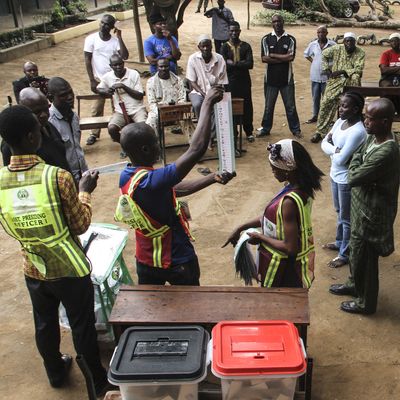
Elections are a cornerstone of democracy, and also one of the most common features undermined by autocratic governments trying to appear democratic. Russia prefers ballot stuffing and voter intimidation. In Uganda, leaders have taken the “arrest the opposition leader” route. Egypt’s president, Abdel Fattah el-Sisi, who ran unopposed this year, didn’t even bother with the appearance of an option candidate. NGOs and civil servants around the world monitor elections to serve as a check on the official government voting results. That being said, conducting opinion polls, reaching out to voters, and monitoring for election interference requires rich resources and mounds of money — two things often in short supply, especially in many of the world’s younger democracies. Some local groups are using their tech knowledge to make the election monitoring process easier.
One company leading this charge is the Nigerian start-up TimbaObjects. Founded in 2009 by Tim Akinbo, the company created an SMS-based program called “Apollo” to help election monitors quickly and efficiently relay voter-turnout information and call out interference.
The Apollo software takes traditional poll-observer documents and pairs each description with a unique code. Election observers can note what time polls open, confirm if voting centers possess the necessary resources to conduct elections (like ink and paper), and determine whether or not any illegal activity occurred. Each one of these situations has an associated code that the observers then text, in real time, to Apollo’s database. From there, analysts can observe the data and compare it to the government’s official election results. They can also dig deeper and look for anomalies or corrupt practice. Before this system, the traditional monitoring process of filling out paper forms and mailing them to a physical data collector, who laboriously inserts each observation manually, could take up to three weeks. With Akinbo’s software, that time gets reduced down to the speed of a text.
Partnering with the National Democratic Institute, TimbaObjects rolled out their election monitoring tools during the 2011 Nigerian presidential elections. As the election neared, Akinbo remembers being overcome by nerves. The validity of the national election — his own nation’s election — fell, at least in part, squarely on his shoulders.
“I felt a huge sense of responsibility,” Akinbo said. “I felt a great sense of patriotism as well.”
In 2015, Akinbo’s software was put to the test once again during what the New York Times referred to as “the most contested election in Nigeria’s post-independence history.” Corruption scandals and the deadly impact of the Boko Haram terrorist group made valid, dependable election monitoring all the more urgent. Election monitors were equipped with a cell phone preloaded with the Apollo software. From there, they sent their observations of voters and election irregularities via text message to the system’s central database. When the dust settled and the final ballots were counted, the former military ruler Muhammadu Buhari, who had previously seized power in a 1983 coup, emerged victorious with 53 percent of the vote. Though the election was contentious, Apollo verified the results as accurate. The software draws strength from its simplicity. While Nigerian monitors may lack the resources and funding of their American and E.U. counterparts, the backbone of their system relies on something nearly every Nigerian has — a cell phone.
The Nigerian test case did not go unnoticed. Since the 2011 election, Apollo has expanded to assist election monitors in 15 countries, Among them Tunisia, Zimbabwe, Zambia, Malawi, and Azerbaijan. Akinbo says Nigerians still remain the software’s top users.
“It is a thing of pride for members of Nigerian civil society that this software is made by Nigerians,” Akinbo said.
Localizing Election Accountability
Local election monitoring can often be a thankless task. Like a bridge off an island, accurate voter monitoring is something people tend not to notice until it ceases to work. Take the recent Russian presidential example. Despite monitoring by numerous international NGOs, the Russian state continues to sufficiently disrupt its own domestic turnout results through ballot stuffing, repeat voting, and voter intimidation. It’s also how you end up with videos like this of people literally using balloons to block off election monitoring cameras while staff members stuffed ballot boxes with papers handed to them by government poll workers. The 2016 Ugandan elections were similarly accused of being both unfair and unfree, despite the presence of international election observers. This proves that the mere presence of observers is not enough. Effective election monitoring requires rapid and accurate reporting, something the data-heavy Apollo attempts to provide.
For Akinbo, the project has just begun. He says that with help from the National Democratic Institute, he hopes to expand the software to local civil society groups worldwide. “Projects like this go a long way to convince people watching that the democratic process is being protected,” he said.
Akinbo has global aspirations. Until then, he’ll continue to hold the government accountable in his home country. Nigeria will conduct another presidential election in February, and Apollo will be there to keep tabs.